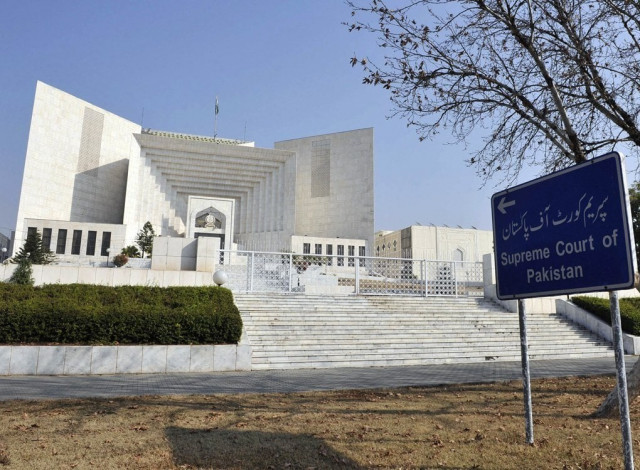Gift of immovable property to minor son cannot be revoked: SC
Court observes that no transfer of possession is required in case of a gift by a father to his minor child

The Supreme Court has ruled that under Islamic law the gift of immovable property by a father in favour of his minor son could not be revoked.
The court also noted that no transfer of possession is required in case of a gift by a father to his minor child or by a guardian to his ward while maintaining that sections 123 and 129 of the Transfer of Property Act did not apply to the hiba (gift) envisioned under the Muslim law.
A three-judge bench of the apex court led by Justice Sajjad Ali Shah adjudicated a question regarding whether a gift of immovable property conveyed by a donor (father/natural guardian) under the Islamic law in favour of a minor child (donee) in the year 1952 could have been revoked by the father in 1970 (almost after 18 years) despite handing over the possession of the property which was accepted by the real mother on behalf of such minor.
Justice Muhammad Ali Mazhar, while authoring the 12-page judgment, observed that when the donor and the donee are related within the prohibited degree, a gift made cannot be revoked.
The judgment also said that if at the time of conveying a gift the donee was minor, the acceptance of gift could be made by his or her guardian and predominantly for the reason of the minority of donee alone, the factum of a gift made by his natural guardian does not cease to exist but remains valid on fulfilment of all ingredients of valid gift.
“A minor donee may not have the capacity to understand the legal consequences as in this case where the donee was only five years of age when his father put into words the gift but minor was a person in existence and thus he was a competent donee.”
Also read: Supreme Court laments male heirs defrauding females
“According to all schools of thoughts under the Muslim law, a father has been recognized and acknowledged as the natural guardian of his child though, in the case in hand, the donor was father and gift was accepted by real mother of donee on his behalf. Even if the gift was not accepted by the mother, it would not have any adverse impact or effect on the gift made by a father in favour of his minor son.”
The court also said that in case a guardian makes a gift in favour of his ward, he declares the gift as a donor and accepts the gift on the part of the donee, the delivery of possession is not compulsory provided that there must be a bona fide intention on the part of the guardian/real father to divest and part from his ownership and pass on it to the donee out of love and affection.
According to authoritative and trustworthy texts on Muslim Law, if the donee is a minor son of the donor, then delivery of possession itself is not de rigueur or compulsory, as it is foreseeable in case of other donees under a hiba, says the order.
The court also said that the possession of the guardian amounts to possession of the minor and separately no aliunde evidence is required to prove that the guardian handed over possession of the property to the minor. In this regard, a lucid exposition has been divulged by D. F. Mulla in his book “Principles of Muhammadan Law” in the annotation No.155, that no transfer of possession is required in the case of a gift by a father to his minor child or by a guardian to his ward. All that is necessary is to establish a bona fide intention to give, it adds.
The court said that it is a matter of record and an undisputed fact that Makhdoom Haider Bakhsh (decd.) had two wives, Iqbal Begum and Dolat Begum. From Mst. Iqbal Begum has one daughter, Zahida Parveen, and one son, Muhammad Yousaf (the beneficiary of the gift mutation in the present list). Whereas from Dolat Begum has two daughters, namely Sajida Parveen and Khalida Parveen, and five sons, namely Alamdar Hussain, Sajid Hussain, Shoukat Hussain, Abid Hussain and Sabir Hussain. The present petitioners are from the second wife (Dolat Begum), but only three of seven legal heirs from the second wife have challenged the order of the high court passed in the second appeal. The second marriage was contracted after making the gift on 19.1.1952 and the gift was revoked by a registered indenture on 25.1.1970, after almost 18 years without any consent of the donee and without any decree of the court.
The revocation, made on the pretext of non-handing over of possession, was unlawful, while in the mutation recorded on 19.1.1952, the donor specifically got recorded his statement that he has handed over the possession to donee, who at that time was obviously a minor so, on his behalf, the possession was accepted by his real mother, therefore, all subsequent proceedings or steps taken under the garb or guise of revocation of the gift were unlawful as the cancellation deed was non-est. in the eye of law and a void one.
The court referred to a Hidayah, wherein it is stated, “If a person make a gift of anything to his relation within prohibited degrees, it is not lawful for him to resume it, because the Prophet has said, “When a gift is made to a prohibited relation, it must not be resumed;” and also because the object of the gift is an increase of the ties of affinity, which is thereby obtained”
The court said that presenting a gift whether grand or tiny is an act of kindness and compassion, and between the parents and children it is somewhat out of love and affection. According to Hedaya, “Hiba”, in its literal sense, signifies the donation of a thing from which the donee may derive a benefit; in the language of the Law it means a transfer of property, made immediately, and without any exchange.” While according to Ameer Ali, “A hiba, pure and simple, is the voluntary transfer, without consideration, of some specific property (whether existing in substance or as a chose in action)”.
According to Mulla, “A hiba or gift is “a transfer of property, made immediately and without any exchange,” by one person to another, and accepted by or on behalf of the latter”. Whereas according to Fyzee, “Hiba” is the immediate and unqualified transfer of the corpus of the property without any return”. According to Sir Abdul Raheem, “The Muhammadan law defines hiba or a simple gift inter vivos as a transfer of a determinate property without an exchange”. A similar definition is provided by Baillie “Gift (hibut.), as it is defined in law, is the conferring of a right of property in something specific, without an exchange”. Similarly, according to Sahih Muslim, “A Hiba is defined as the transfer of possession of the property, movable and immovable, from one person to the other willingly and without reward”
The judgment said that the Transfer of Property Act, 1882, has no application to the hiba/gift envisioned and encapsulated under the Muslim Law and for this reason, Section 123 and 129 of the Transfer of Property Act can neither surpass nor outweigh or preponderate the matters of oral gifts contemplated under the Muslim law for which a registered instrument or indenture is not mandatory.
Also read: Top court sets guidelines for promulgating ordinance
All orthodox and unequivocal annotations and explications based on Islamic Jurisprudence vis-à-vis “Hiba” have unambiguously emphasized and underlined the fact that the donor should be compos mentis, meaning thereby a person who is of sound mind and has the mental capacity to understand the legal implications of his act of making a gift and he must be major and the owner of the property which is intended to be gifted; the thing gifted should be in existence at the time of hiba; the thing gifted should be such to benefit from which is lawful under the Shariat; the donor must be free from any coercion/duress or undue influence while making a gift; the thing gifted should come in the possession of the donee himself or through his representative/guardian for an effective hiba.
“Under the Muslim law, the constituents and components of a valid gift are tender, acceptance and possession of the property. A Muslim can devolve his property under Muslim law by means of inter vivos (gift) or through testamentary dispositions (will).
Islamic law does not make any distinction between a movable or immovable property concerning the conception of hiba, rather any property may be gifted by any person having ownership and dominion over the property intended to be gifted on fulfilling requisite formalities.
“It is also obligatory that the donor divest and dissociate himself downrightly from the dominion and ownership over the property of gift and put into words his categorical intention to convey the ownership to the donee distinctly and unambiguously with the delivery of possession of the property and ensure that donee has secured physical ascendency over the property to constitute the delivery of possession."



















COMMENTS
Comments are moderated and generally will be posted if they are on-topic and not abusive.
For more information, please see our Comments FAQ